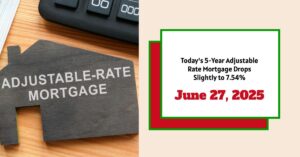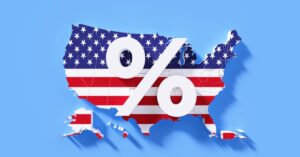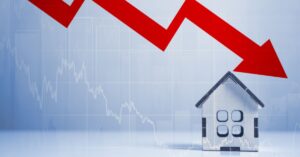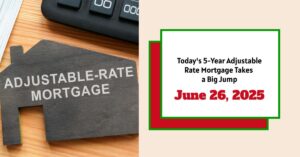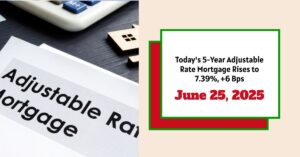Navigating the world of mortgages can feel like trying to decipher a secret code. Among the various options, the 5-Year Adjustable Rate Mortgage (ARM) stands out as a unique choice. According to Zillow, as of today, June 27, 2025, the national average 5-year ARM mortgage rate is at 7.54%. This article will help dive deep into the 5-year ARM, its implications, and whether it's the right fit for your financial journey. Let's get started!
Today's 5-Year Adjustable Rate Mortgage Drops Slightly to 7.54% – June 27, 2025
Understanding the 5-Year Adjustable Rate Mortgage (ARM)
An Adjustable Rate Mortgage isn't as scary as it sounds. Essentially, it's a home loan with an interest rate that's fixed for a specific period (in this case, five years) and then adjusts periodically based on market conditions. This is different from a fixed-rate mortgage, where the interest rate remains the same throughout the life of the loan.
How does it work?
The 5-year ARM has two distinct phases:
- Initial Fixed-Rate Period: For the first five years, your interest rate remains constant. This provides predictability in your monthly mortgage payments during this period.
- Adjustment Period: After the initial five years, the interest rate adjusts at predetermined intervals (usually annually) based on a benchmark interest rate (like the Prime Rate or the LIBOR, though LIBOR will likely be replaced). The margin (a fixed percentage added to the index) is added to determine the new interest rate.
- For instance, if the benchmark is 3% and the margin is 2.75%, the adjusted interest will be 5.75%.
The Current Mortgage Rate Environment: June 27, 2025
Before diving deeper into ARMs, let's set the stage with a snapshot of the current mortgage rates on June 27, 2025 (Zillow Data):
| Loan Program | Rate | 1-Week Change | APR | 1-Week Change |
|---|---|---|---|---|
| 30-Year Fixed Rate | 6.74% | Down 0.17% | 7.20% | Down 0.17% |
| 15-Year Fixed Rate | 5.74% | Down 0.22% | 6.04% | Down 0.22% |
| 5-Year ARM | 7.54% | Up 0.34% | 7.96% | Up 0.17% |
It's evident that while fixed-rate mortgages might be trending slightly down, the 5-year ARM has seen a slight increase in the past week. It is extremely important to note the rate, APR and week's change for various mortgage products before making an informed decision.
Advantages of Choosing a 5-Year ARM
Okay, so why would anyone choose an ARM over the stability of a fixed-rate mortgage? Here are some compelling reasons:
- Lower Initial Interest Rate: Historically, ARMs often start with a lower interest rate compared to fixed-rate mortgages. This translates to lower monthly payments during the initial fixed-rate period.
- Ideal for Short-Term Homeowners: If you plan to sell or refinance your home within five years, you can capitalize on the lower rate without experiencing any interest rate adjustments (this is the biggest reason for choosing a 5-year ARM).
- Potential for Lower Rates During the Adjustment Period: If interest rates fall or remain stable during the adjustment period, your mortgage rate could decrease, leading to even lower monthly payments.
- Suitable for Those Expecting Income Growth: If you anticipate a significant increase in your income in the future, you might be comfortable with the risk of a potential rate increase because you'll be better equipped to handle larger payments.
The Risks and Downsides of a 5-Year ARM
It's crucial to acknowledge the potential pitfalls associated with 5-year ARMs:
- Interest Rate Risk: The primary risk is the possibility of your interest rate increasing during the adjustment period. If interest rates rise significantly, your monthly payments could become unaffordable.
- Rate Caps and Floors: Most ARMs have rate caps, limiting how much the interest rate can increase at each adjustment and over the life of the loan. However, even with caps, substantial increases are possible. Floors limit how low the interest rate can go should the market crash.
- Complexity: ARMs can be more complex to understand than fixed-rate mortgages. You need to consider the index, margin, adjustment frequency, and rate caps and floors.
- Refinancing Costs: If rates start to rise, you might consider refinancing into a fixed-rate mortgage, but this entails additional costs like appraisal fees, origination fees, and title insurance.
- “I've seen people gamble on ARMs, hoping rates would stay low, only to be caught off guard when they jumped. It's a risk you have to weigh carefully,” I always advised my clients”.
Who is a 5-Year ARM Right For?
Here's a breakdown of situations where a 5-year ARM might be a smart choice:
- First-Time Homebuyers with Short-Term Plans: If you're buying your first home as a starter property and plan to upgrade within a few years, a 5-year ARM can offer lower initial payments.
- Real Estate Investors: Investors who buy, renovate, and flip properties often use ARMs because they typically have a short investment timeline. They are betting on the property value increasing in the short term.
- Borrowers Expecting Rising Income: As mentioned earlier, if you anticipate a significant increase in income, you may be able to handle potential rate adjustments.
- Those Comfortable with Risk: If you have a high risk tolerance and believe that interest rates will remain stable or decrease, you might be willing to take a chance on an ARM.
Recommended Read:
5-Year Adjustable Rate Mortgage Update for June 26, 2025?
Fixed vs. Adjustable Rate Mortgage in 2025: Which is Best for You
Who Should Avoid a 5-Year ARM?
Conversely, here are scenarios where a 5-year ARM might not be the best option:
- Risk-Averse Borrowers: If you value stability and predictability in your mortgage payments, a fixed-rate mortgage is a safer bet. An ARM can cause sleepless nights if rates are volatile.
- Those Planning to Stay in the Home Long-Term: If you plan to live in the home for more than five years, you'll eventually face interest rate adjustments, which could disrupt your budget.
- Borrowers with Tight Budgets: If you have a limited budget and can barely afford the initial payments, a potential rate increase could push you into financial distress.
- Those Unfamiliar with Financial Markets: If you don't understand how interest rates work and are uncomfortable with market fluctuations, it's best to steer clear of ARMs.
Key Factors to Consider When Evaluating a 5-Year ARM
Ready to make a decision? Here are the crucial factors to consider:
- Interest Rate Caps: Understand the initial rate cap, the periodic rate cap (the maximum increase at each adjustment), and the lifetime rate cap (the maximum the interest rate can rise over the life of the loan).
- The Index and Margin: Know which index the ARM is tied to (e.g., Prime Rate). The margin is the fixed percentage added to the index to determine the interest rate.
- Recession: How would a global or country-level recession affect your ability to be able to deal with rising mortgage payments?
- Adjustment Frequency: Determine how often the interest rate will adjust (e.g., annually, semi-annually).
- Prepayment Penalties: Check if there are any penalties for paying off the mortgage early or refinancing.
- Your Financial Situation: Assess your income, credit score, debt-to-income ratio, and overall financial stability.
- Market Conditions: Research current and projected interest rate trends. Consult with a financial advisor to get expert opinions. However, remember that no one has a crystal ball.
Comparing 5-Year ARMs with Other Mortgage Options
Let's briefly compare the 5-year ARM with other popular mortgage types:
| Mortgage Type | Interest Rate | Payment Stability | Best For |
|---|---|---|---|
| 5-Year ARM | Lower Initial | Variable | Short-term homeowners, investors, risk-takers |
| 30-Year Fixed Rate | Higher | Stable | Long-term homeowners, risk-averse individuals |
| 15-Year Fixed Rate | Moderate | Stable | Those wanting to pay off their mortgage quickly |
Final Thoughts: Is the 5-Year ARM Right for You?
On June 27, 2025, the 5-year ARM presents both opportunities and risks. The rate of 7.54% might be attractive if you're looking for lower initial payments, but it's important to weigh this against the potential for future rate increases.
Ultimately, the decision of whether to choose a 5-year ARM depends on your individual circumstances, financial goals, and risk tolerance. Consider your options carefully, do your research, consult with a mortgage professional (or several!), and make the choice that's best for you. After all, your home is one of the biggest investments for your life, so take calculated risks!
Capitalize on ARM Rates Before They Rise Even Higher
With fluctuating adjustable-rate mortgages (ARMs), savvy investors are exploring flexible financing options to maximize returns.
Norada offers a curated selection of ready-to-rent properties in top markets, helping you capitalize on current mortgage trends and build long-term wealth.
HOT NEW LISTINGS JUST ADDED!
Connect with an investment counselor today (No Obligation):
(800) 611-3060
Also Read:
- Will Mortgage Rates Go Down in 2025: Morgan Stanley's Forecast
- Expect High Mortgage Rates Until 2026: Fannie Mae's 2-Year Forecast
- Mortgage Rate Predictions 2025 from 4 Leading Housing Experts
- Mortgage Rates Forecast for the Next 3 Years: 2025 to 2027
- Will Mortgage Rates Ever Be 3% Again in the Future?
- Mortgage Rates Predictions for Next 2 Years
- Mortgage Rate Predictions for Next 5 Years
- Mortgage Rate Predictions: Why 2% and 3% Rates are Out of Reach
- How Lower Mortgage Rates Can Save You Thousands?
- How to Get a Low Mortgage Interest Rate?
- Will Mortgage Rates Ever Be 4% Again?
